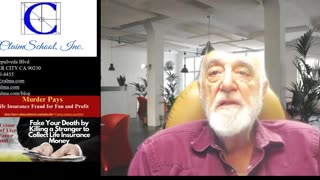Premium Only Content

When Docs Lie to Insurers
To Allege IFPA Fraud Plaintiff Need only Plead the Defendants Knowledge, Falsity, and Materiality of Insurance Claim
Stephen J. Conte, D.O. (“Dr. Conte”), and various other health care providers (collectively, the “Defendants”) moved the court to dismiss plaintiffs Aetna, Inc. and Aetna Life Insurance Company's (collectively, the “Plaintiffs”) Complaint pursuant to Federal Rule of Civil Procedure 12(b)(6). In Aetna, Inc. et al. v. Open MRI And Imaging Of Rochelle Park, P.A. et al., Civil Action No. 21-20043, United States District Court, D. New Jersey (November 23, 2022) the USDC applied the New Jersey Insurance Frauds Prevention Act (IFPA) to resolve the motions.
BACKGROUND
This case arises out of allegations that Defendants engaged in fraudulent billing schemes to profit from administering to patients COVID-19 rapid tests.
General Practices
Plaintiffs alleged that at the outset of the COVID-19 pandemic, Open MRI and Vestibula, radiology laboratories, with the other defendants, began providing COVID-19 rapid tests to patients at their joint practice location in New Jersey. Plaintiffs asserted that in taking a rapid test at Open MRI or Vestibula, a patient “would have their temperature taken, answer a series of screening questions regarding their symptoms, receive a nasal swab, and shortly thereafter be provided with test results." Plaintiffs contended that the entire interaction would last “no more than a few minutes and involved minimal interaction with a physician.” Defendants allegedly charged their patients $35 for a rapid test, but then “submitted significantly higher charges” to Plaintiffs for reimbursement.
Plaintiffs alleged that to profit from the administration of COVID-19 rapid tests Defendants implemented four fraudulent schemes: 1) billing for COVID-19 tests performed without required licenses and authorizations; 2) billing for specimen handling services not rendered; 3) inflating charges for services provided, a tactic known as “upcoding”; and 4) submitting claims through various businesses to avoid Plaintiff's fraud detection protocols.
Upcoding
In addition to allegedly billing for services not rendered, like specimen handling, Plaintiffs also contend that Defendants “upcoded” their claims that is, Defendants allegedly inflated their bills by submitting claims requesting compensation for more involved medical services than were actually provided when administering a COVID-19 rapid test. Plaintiffs allege that due to this upcoding, Plaintiff overpaid Defendants in excess of $500,000 for claims misrepresenting the services Defendants rendered.
Avoiding Detection by Plaintiffs' Fraud Department
Last among the purported fraudulent schemes, Plaintiffs allege Defendants submitted claims from other defendants, Universal and Integrated, to conceal their improper billing practices.
DEFENDANTS' MOTION TO DISMISS
Defendants challenged the sufficiency of Plaintiffs' Complaint on two grounds. First, as it relates to Plaintiff's fraud-based claims insurance fraud, common law fraud, and negligent misrepresentation Defendants argue that Plaintiffs' allegations are not pleaded with the specificity required by Federal Rule of Civil Procedure 9(b)
Fraud-Based Claims
Under New Jersey law, to establish a common law fraud claim, a plaintiff must demonstrate:
a material misrepresentation of a presently existing or past fact;
knowledge or belief by the defendant of its falsity;
an intention that the other party rely on it;
reasonable reliance thereon by the other party; and
resulting damages.
In contrast to common law fraud and negligent misrepresentation, the Insurance Fraud Prevention Act does not require proof of reliance on the false statement or resultant damages, nor proof of intent to deceive. Instead, to sustain a fraud claim under the Insurance Fraud Prevention Act, a plaintiff must only allege knowledge, falsity, and materiality.
A plaintiff must support its fraud allegations by demonstrating the “who, what, when, where and how of the events at issue. However, a plaintiff need not allege every material detail so long as it pleads the circumstances of the fraud with sufficient particularity to place a defendant on notice of the precise misconduct with which it is charged.
The USDC concluded that Plaintiff adequately alleged its fraud-based claims with the requisite specificity by asserting that Defendants engaged in a series of fraudulent schemes to induce Plaintiffs to pay Defendants for services Defendants were not authorized to render or were not rendered at all. Moreover, Plaintiffs alleged that Defendants submitted these claims knowing that they were false, and further knowing that Plaintiffs would rely on Defendants' representations regarding what services were rendered as being true and accurate.
These allegations establish each element of Plaintiffs' fraud-based claims, and taken together, are sufficiently particular to place Defendants on notice of the conduct giving rise to Plaintiffs' claims, in satisfaction of Rule 9(b)'s heightened pleading standard.
Accordingly, Defendants' motion to dismiss for failure to satisfy Rule 9(b) was denied and the parties will be required to go to trial to either prove the health care provider defendants acted fraudulently or the defendants are able to prove they did not commit fraud.
ZALMA OPINION
Aetna should be commended for recognizing an attempted or actual fraud and acting, proactively, to sue on behalf of the state of New Jersey under the IFPA to punish those they believed had committed fraud and obtain damages for the insurers and the state from those who perpetrated fraud. Insurance fraud is a crime in the state of New Jersey but may not be a crime the state is willing to pursue. The IFPA allows insurers to act on behalf of the state to deter or defeat insurance fraud. If the allegations prove true the conduct of the health care providers to profit from a pandemic is a clear violation of the Hippocratic oath and is, in my opinion, evil.
(c) 2022 Barry Zalma & ClaimSchool, Inc.
Subscribe and receive videos limited to subscribers of Excellence in Claims Handling at locals.com https://zalmaoninsurance.locals.com/subscribe.
Go to substack at substack.com/refer/barryzalma Consider subscribing to my publications at substack at substack.com/refer/barryzalma
Barry Zalma, Esq., CFE, now limits his practice to service as an insurance consultant specializing in insurance coverage, insurance claims handling, insurance bad faith and insurance fraud almost equally for insurers and policyholders. He practiced law in California for more than 44 years as an insurance coverage and claims handling lawyer and more than 54 years in the insurance business. He is available at http://www.zalma.com and [email protected]
-
 13:02
13:02
Barry Zalma, Inc. on Insurance Law
1 year agoMurder Pays
4391 -
 19:15
19:15
Nikko Ortiz
20 hours agoOstrich Gets A Taste For Human Blood
55.2K16 -
 32:42
32:42
MetatronHistory
1 day agoWas FASCISM Left wing or Right wing?
9.01K32 -
 LIVE
LIVE
Flex011
5 hours ago $0.01 earnedFrom Scrap to Stronghold: Our Base is Live!
92 watching -
 9:52
9:52
MattMorseTV
14 hours ago $15.43 earnedTrump just GAVE the ORDER.
18.7K55 -
 LIVE
LIVE
PudgeTV
1 hour ago🟣 Arc Raiders - Gaming on Rumble | Monday Madness
61 watching -
 LIVE
LIVE
Max
7 hours agoMax Streaming
44 watching -
 2:13:31
2:13:31
The Connect: With Johnny Mitchell
1 day ago $24.28 earnedIs Garth Brooks A Serial Killer? Exposing The Dark Secrets Of Country Music's Biggest Star
36.1K19 -
 LIVE
LIVE
Phyxicx
11 hours agoBack to FF8 - Let's actually play the story now! - 11/23/2025
65 watching -
 19:19
19:19
GritsGG
16 hours agoINSANE Trio Match! Most Winning Warzone Player IGLs to Victory!
14.6K1